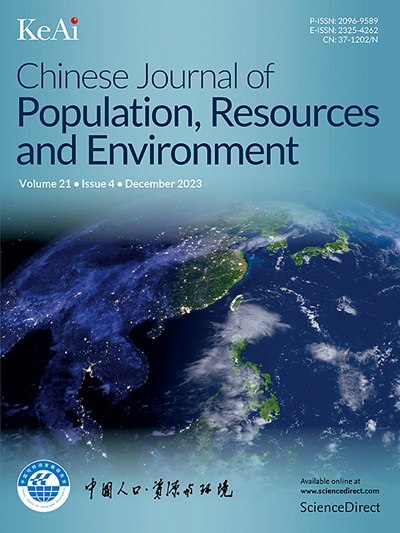Green human development in Indonesia: Role of renewable and nonrenewable energy
IF 4.8
4区 环境科学与生态学
Q2 ENVIRONMENTAL STUDIES
Chinese Journal of Population Resources and Environment
Pub Date : 2025-09-01
DOI:10.1016/j.cjpre.2025.07.010
引用次数: 0
Abstract
As the world’s fourth most populous country, Indonesia presents challenges and opportunities for sustainable energy progress, offering a critical context to investigate green human development (GHD). This study uniquely contributes to the literature by employing the planetary pressures-adjusted human development index (PHDI) as an indicator of GHD, which integrates environmental impacts into human development. Using static and dynamic econometric methods, including the quantile regression and autoregressive distributed lag model, it explores the impacts of renewable and nonrenewable energy consumption on GHD. The findings demonstrate that renewable energy currently has a detrimental impact on GHD due to its limited adoption and high costs. Conversely, nonrenewable energy positively influences GHD, as it is the primary energy source in the country and is becoming more efficient at reducing emissions. However, the study finds that greater use of renewable energy reduces its adverse effects, suggesting that as renewable energy technologies become more cost-effective and widely implemented, their initial adverse effects could be mitigated, leading to improved long-term GHD outcomes. These findings carry important implications for Indonesia, where the government is striving to expand renewable energy capacity while promoting equitable development across its archipelagic regions. They underscore the critical role of energy policy in balancing economic, social, and environmental goals, contributing meaningfully to the country’s sustainable development agenda.
印度尼西亚的绿色人类发展:可再生能源和不可再生能源的作用
作为世界上人口第四多的国家,印度尼西亚为可持续能源进步提供了挑战和机遇,为研究绿色人类发展(GHD)提供了重要背景。本研究采用地球压力调整人类发展指数(PHDI)作为GHD的指标,将环境影响纳入人类发展,为文献做出了独特贡献。采用静态和动态计量经济学方法,包括分位数回归和自回归分布滞后模型,探讨了可再生能源和不可再生能源消费对GHD的影响。研究结果表明,由于可再生能源的有限采用和高成本,目前对温室气体排放产生了不利影响。相反,不可再生能源对温室气体排放产生积极影响,因为它是该国的主要能源,并且在减少排放方面越来越有效。然而,该研究发现,更多地使用可再生能源可以减少其不利影响,这表明,随着可再生能源技术变得更具成本效益并得到广泛实施,它们最初的不利影响可能会得到缓解,从而改善长期的温室气体排放结果。这些发现对印尼具有重要意义,印尼政府正在努力扩大可再生能源产能,同时促进其群岛地区的公平发展。它们强调了能源政策在平衡经济、社会和环境目标方面的关键作用,为国家的可持续发展议程做出了有意义的贡献。
本文章由计算机程序翻译,如有差异,请以英文原文为准。
求助全文
约1分钟内获得全文
求助全文
来源期刊

Chinese Journal of Population Resources and Environment
ENVIRONMENTAL STUDIES-
CiteScore
4.30
自引率
1.10%
发文量
791
审稿时长
79 days
期刊介绍:
The Chinese Journal of Population, Resources and Environment (CJPRE) is a peer-reviewed international academic journal that publishes original research in the fields of economic, population, resource, and environment studies as they relate to sustainable development. The journal aims to address and evaluate theoretical frameworks, capability building initiatives, strategic goals, ethical values, empirical research, methodologies, and techniques in the field. CJPRE began publication in 1992 and is sponsored by the Chinese Society for Sustainable Development (CSSD), the Research Center for Sustainable Development of Shandong Province, the Administrative Center for China's Agenda 21 (ACCA21), and Shandong Normal University. The Chinese title of the journal was inscribed by the former Chinese leader, Mr. Deng Xiaoping. Initially focused on China's advances in sustainable development, CJPRE now also highlights global developments from both developed and developing countries.
 求助内容:
求助内容: 应助结果提醒方式:
应助结果提醒方式:


